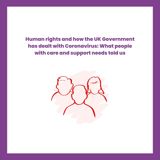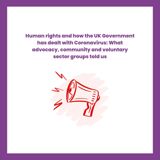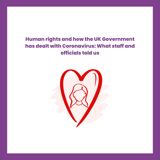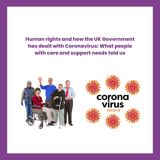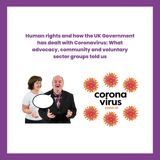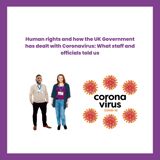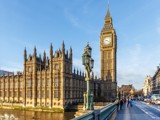Our work
COVID-19
On 19 March 2020, the Coronavirus Bill was laid before Parliament and on the same day, the Joint Committee on Human Rights (JCHR) announced it would carry out an inquiry into the UK Government’s response to the Covid-19. We conducted research to submit evidence to the JCHR's inquiry.
Our evidence to the JCHR
The JCHR inquiry looked at laws the Government introduced to contain and control the Covid-19 outbreak, how those measures were implemented and how the response affected different groups of people. The Committee took written and oral evidence from people across the UK as part of its inquiry. We submitted evidence to the JCHR inquiry that was directly informed by people’s real-life experiences of the issues, drawn from our work to support people to understand and access their human rights. The evidence gathered through our work informed our main concerns and suggestions for the steps that needed to be taken to ensure that measures taken by the Government to address the Covid-19 pandemic were human rights compliant.
We collected evidence from 230 people across England, Scotland and Wales representing three groups we work with:
- People accessing (or trying to access) health and care;
- Staff working in health and care, education and housing; and
- Advocates and campaigners
We produced three reports reflecting the experiences of each of these groups
We also made Easy Read versions
Our findings
Our findings make for worrying reading, shining a spotlight on the realities of changes to law, policy and access to care and treatment for people with support needs.
68%
of people said their care and support got worse
45%
of people said their specific characteristic and needs were not considered
82%
of staff said it became harder to uphold people’s human rights
76%
of staff were not provided with clear training or information to uphold human rights
65%
of advocates said it became more necessary to use human rights to challenge poor practice
Our CEO said...
“During Covid-19 we’ve heard the line “this virus does not discriminate” many times; our research shows that the reality of the government’s pandemic response has been very different. People with care and support needs are on the sharp end of decisions to change, restrict and deny access to medical treatments, as well as the very basic things that we all need to live well, especially in these most difficult of times.
Almost 1 in 10 people told us they had experienced pressure or use of Do Not Resuscitate Orders, 50% of staff in health, care and social work felt people were being discriminated against because of they have care and support needs, and more than 50% of advocates and community groups said there was no clarity about what laws were being used to enable these drastic cuts to people’s care.
These have been unprecedented times, but times in which people and their human rights must be front and centre. Human rights must guide the Covid-19 response, an essential warning system to show who is most at risk, and a framework for making the difficult decisions. Having supported over a 1000 people across the UK since April we know that too few know and advocate for their human rights as legal standards that not only should, but must, be abided by. Yet, this same work also shows that when people and staff use human rights in these difficult times, they can challenge the inequalities in service delivery, practices and policies that put people at risk.
There are calls for inquiries, and accountability must be ensured. But more than this, the pandemic has exposed further how poor law, policy and practice means some lives are deemed less worthy. It is not enough to look back and say that was wrong; we must look for change now and in the coming months; there must be immediate change. If we truly believe in dignity and respect, then the human rights principles of lawful, legitimate, proportionate and non-discriminatory must guide the response to, and recovery, from this pandemic.”
The JCHR's report
The Joint Committee on Human Rights published their Report on the Government's response to COVID-19: human rights implications on 21 Sept 2020. The JCHR calls on the Government to urgently address a number of issues to ensure that its handling of the Coronavirus pandemic is human rights compliant. The JCHR report refers to several of the findings from BIHR’s research reports above. You can read the summary, read the conclusions and recommendations, or read the full report: The Government’s response to COVID-19: human rights implications.
The report looked at a number of issues affecting the right to life (Article 2), including the allocation and prioritisation of personal protective equipment (PPE) and blanket use of Do Not Attempt Cardiopulmonary Resuscitation (DNACPR) notices in care homes. It also looked at temporary changes (known as “easements”) to the Care Act which meant some duties to support people could be paused (this easement ended on 16th July 2021). The report referred to BIHR research which found 76% of respondents working in health and care said they were not provided with legal training or clear information about upholding human rights law while working during Covid-19. It also referred to BIHR research which found 68% of respondents said their care and support (or that of their loved one) had got worse during Covid-19.
The report also examined the effect of lockdown regulations, risks in detention settings, contract tracing and privacy rights, access to justice, children’s rights and scrutiny and review of emergency legislation.
Related information
Stay up-to-date
Get our newsletter
Get monthly updates on UK human rights law and our work, resources and events sent straight to your inbox.

